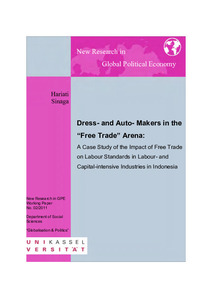| dc.date.accessioned | 2011-05-27T09:03:24Z | |
| dc.date.available | 2011-05-27T09:03:24Z | |
| dc.date.issued | 2011-05-27T09:03:24Z | |
| dc.identifier.uri | urn:nbn:de:hebis:34-2011050537307 | |
| dc.identifier.uri | http://hdl.handle.net/123456789/2011050537307 | |
| dc.language.iso | eng | |
| dc.rights | Urheberrechtlich geschützt | |
| dc.rights.uri | https://rightsstatements.org/page/InC/1.0/ | |
| dc.subject | free trade | eng |
| dc.subject | ASEAN Free Trade Agreement | eng |
| dc.subject | labour standards | eng |
| dc.subject | labour-intensive industry | eng |
| dc.subject | capital-intensive industry | eng |
| dc.subject | garment industry | eng |
| dc.subject | auto industry | eng |
| dc.subject | Indonesia | eng |
| dc.subject | female workers | eng |
| dc.subject.ddc | 320 | |
| dc.title | Dress- and Auto- Makers in the “Free Trade” Arena | eng |
| dc.type | Working paper | |
| dcterms.abstract | Even though there have been many studies on the impact of trade liberalisation on labour standards, most of the studies are at national level, and there is a lack of research at industry level. This paper examines the impact of free trade on labour standards in capital- and labour-intensive industries in a developing country. For empirical findings, I take the case of the garment industry, representing labour-intensive industry, and automotive industry, representing capital-intensive industry, in Indonesia in the face of ASEAN Free Trade Area (AFTA). Since the garment industry is a women-dominated industry, while the automotive industry is a men-dominated industry, this paper also employs a feminist perspective. As such, this paper also investigates whether free trade equally affects men and women workers. Besides free trade, other independent variables are also taken into account. Employing quantitative and qualitative methods, empirical evidence shows that there is an indication that free trade has a negative relationship with labour standards in the garment industry, whereas a positive relationships with labour standards in the automotive industry. This implies that free trade might result in decreasing labour standards in labour-intensive industry, while increasing standards in capital-intensive industry. It can also be inferred that free trade unequally affect men and women workers, in that women workers bear the brunt of free trade. The results also show that other internal and external independent variables are indicated to have relationships with labour standards in the garment and automotive industries. Therefore, these variables need to be considered in examining the extent of the impact of free trade on labour standards in labour- and capital-intensive industries. | eng |
| dcterms.accessRights | open access | |
| dcterms.alternative | A Case Study of the Impact of Free Trade on Labour Standards in Labour- and Capital-intensive Industries in Indonesia | eng |
| dcterms.creator | Sinaga, Hariati | |
| dcterms.isPartOf | New Research in Global Political Economy ;; 02/2011 | eng |
| dc.subject.swd | Indonesien | ger |
| dc.subject.swd | Asiatische Freihandelszone | ger |
| dc.subject.swd | Kraftfahrzeugindustrie | ger |
| dc.subject.swd | Bekleidungsindustrie | ger |
| dc.subject.swd | Arbeitsbedingungen | ger |
| dcterms.source.series | New Research in Global Political Economy | |
| dcterms.source.volume | 02/2011 | |

